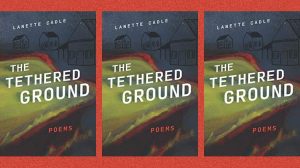
Forest Primeval by Vievee Francis / Northwestern University Press / 2016 / 978-0-8101-3243-6
Every so often I take a trip to the woods, and every time I come out having had a different experience. Heraclitus said this best with, “You could not step twice into the same river; for other waters are ever flowing on to you.” Such is the case each time I step into Vievee Francis’ insightful Forest Primeval. This book is a 92-page guide that takes you on a journey of self-discovery, as a woman learns to navigate unfamiliar terrain and what it means to be happy. Francis, a self-proclaimed pro at navigating urban life, shows us the hunger that waits silently in us all, until isolation, in the form of mountains, calls it out from the depths. “I want to put down what the mountain has awakened,” (3) Francis begins, with the first poem “Another Antipastoral.” From there, we taste the grass, shed our skin, and shiver in the wind of her wisdom. We hear the plovers, the nightjars, and the shrikes. We live with them.
The book is divided into six sections, each giving a voice to an understanding of a time when the speaker was voiceless. It is not an intimate conversation with readers, but rather, the intimate conversation that, perhaps, Francis had with herself as she ingested the forest and discovered why she wasn’t happy in a place that was supposed to be delicious. This journey is much like Francis’ journey into poetry itself, as there was no mentor to show her anything. She discovered it on her own through reflection and observation. In an interview with Muzzle Magazine, Francis stated she was self-taught, “And a couple of poets argue with me about that, but I was. I didn’t study poetry in college. I think I had a class for a week-and-a-half before I dropped it as an undergrad. I read other poets and practiced. I read and I practiced. And I gravitated toward other serious poets. I loved their company and I learned by listening as well” (Steadwell, n.p.).
This is why Forest Primeval subtly offers readers a raw curiosity for the world and one’s place within it, while it overtly demands answers from the universe about the animals, violence, and the music in us all. Francis uses the violence of nature, watching birds breaking free from their nests, or the wind battering a house to show us the war of both urban and rural life. But then, she paints a picture of what is idyllic to her, like in “Visiting the House on Long Island.” Readers understand how the word is plaguing Francis, then she wraps us around the why as we get the following:
Like the memory of a monarch landing
in the palm of the hand the summer’s end
contains no promise so its moment is held only briefly
Little separates this pool from the Sound
a stone wall A rail The gulls fly over both and
the gabled roofs as well Children jump into the water
as children will—headlong Oblivious to the hints
of ending
The slight cut in the air
Birds following the butterflies south.(41)
Her influences are heard in nature and in the city by poets like Jamaal May, as we see birds filling city skies, people in ruins, and fire from mouths, weapons, and words. While Francis doesn’t note any direct influences, she has undoubtedly influenced more than just Jamaal May. Francis bends language through diction, enjambment, and an omnipotent perspective, or as Sebastian Matthews notes, “omnidirectionally, so that her subject (or one of them) becomes the way in which the experience of place, and a time in life, get haunted by the past – by the places and people and stories we carry in our bodies” (n.p.) to show us how everything is connected: emotions, people, cities, nature, and time. Vievee Francis takes language, holds it up to the light, and proclaims it transparent, as in “Seen Through”:
Such thin things – a white shirtsleeve,
the glancing eye lighting upon the glancing
eye, the smell of soap on the skin
before the sun heats everything to discomforting
sharpness. The barriers are so permeable really –
a membrane, simple, and opaque between knowing
and knowing better. I don’t stroke your back,
I don’t reach to heal the fragile vertebrae
beneath the porous cotton starched into an envelope,
like an invitation. I don’t dare open. (62)
What I want, more than anything, is for everyone to see is that this book is more than just a way to recognize violence as it exists in different landscapes; it is a way to understand the interconnectedness of all violence and how it flows from people to places and places to people in the same way a river brings life to trees, and the trees, in return, succumb to the force of the water, only to bottleneck the river later on, forcing the water elsewhere.
Works Cited
Francis, Vievee. Forest Primeval. TriQuarterly Books, 2016.
Matthews, Sebastian. Review of Forest Primeval. 2016.
Steadwell, Laura. “Interview with Vievee Francis.” Muzzle Magazine. N.d., www.muzzlemagazine.com/vievee-francis-interview.html





Leave a Reply